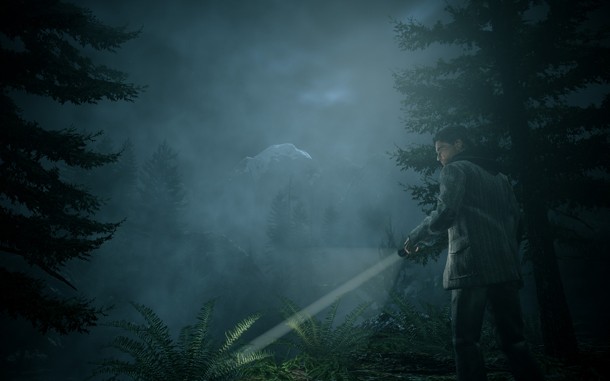Cult Classics – Alan Wake

Despite being a big fan of Remedy’s Max Payne series, Alan Wake’s announcement floated by me relatively unnoticed. I’m thankful the game grabbed my attention during a Microsoft press event, or I may have missed out on a great action game with a heavy dose of mystery. The warmly received 360 and Arcade game (read our review) didn’t meet sales expectations out of the gate, leading me to believe many gamers haven’t given it a try. This is their wake-up call.
I didn’t know a lot about Alan Wake leading up its release. However, I was an immediate fan of Remedy’s Max Payne series. Bullet time was a great time, but that’s not what kept me coming back. I loved how Max’s heavy-handed, metaphor-laden monologues fit the noir tone so well. I also appreciated the surreal nature of the comic-book panels used to drive the story forward, along with the bizarre TV shows playing on TV sets throughout the game. Max’s life sucked, and Remedy wasn’t afraid to illustrate that with a macabre home invasion sequence and twisted nightmares. These elements were polished up in Max Payne 2, and that game put Remedy on my radar. Max Payne 2’s faux-TV series, Address Unknown, sticks with me specifically. Its brooding narration and oddball twists planted the seeds of Alan Wake. (In fact, Address Unknown’s doppleganger antagonist John Mira resembles Mr. Scratch from Alan Wake’s American Nightmare).
I first played Alan Wake at a Microsoft showcase event prior to release. These flashy, loud events aren’t generally the best environments to play dark, atmospheric games, but Alan Wake still sucked me in. The tale of a fiction writer whose stories were manifesting in a small lumbering town fascinated me. Like Max Payne, I enjoyed the gameplay – shining away enemies’ dark, protective auras with a flashlight and blasting them with shotguns is a treat. But the unpredictable Twin Peaks-esque story glued me to the game. The immersive effect was heightened when I finally got my hands on the final product.
Nailing down a specific element that makes Alan Wake great is difficult. There are plenty of memorable moments – Defending a concert stage as pyrotechnics erupt and rock music blares, fleeing from a gigantic tornado, and an eerie trek through a mansion dedicated to helping troubled creative types. Pages of Alan Wake’s manuscript are scattered across the game world, which are read aloud to flesh out the story and prophesize upcoming events. It may sound minor, but voice actor Matthew Porretta’s emotional narration drives these enigmatic excerpts home. For me, Alan Wake is a smooth blend of satisfying gameplay and an enthralling story. Few game conclusions spark breathless hypothesizing around the Game Informer office like Alan Wake’s did.
I’m excited for Remedy’s new title, Quantum Break, but can’t help but be a little sad about the developer shelving Alan Wake 2 (It’s impossible not to be a little after melancholy watching writer Sam Lake essentially break up with his fans). I enjoyed my time with the DLC follow-up, Alan Wake’s American Nightmare, despite the heavy backtracking element. While fans of the unique title have to wait for the next chapter In Alan Wake’s story, those that missed out are in for a treat. That is, if I’ve convinced you.

Get the Game Informer Print Edition!
Explore your favorite games in premium print format, delivered to your door.
- 10 issues per year
- Only $4.80 per issue
- Full digital magazine archive access
- Since 1991









